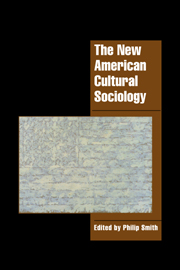Book contents
- Frontmatter
- Contents
- Notes on contributors
- Preface
- The new American cultural sociology: an introduction
- PART I Culture as text and code
- PART II The production and reception of culture
- PART III Culture in action
- 11 Culture and social action
- 12 Culture, structure, agency, and transformation
- 13 Discourse, nuclear power, and collective action
- 14 Moral boundaries, leisure activities, and justifying fun
- 15 Honor and conflict management in corporate life
- 16 The role of cultural capital in school success
- Index
- Title in this Series
16 - The role of cultural capital in school success
Published online by Cambridge University Press: 18 January 2010
- Frontmatter
- Contents
- Notes on contributors
- Preface
- The new American cultural sociology: an introduction
- PART I Culture as text and code
- PART II The production and reception of culture
- PART III Culture in action
- 11 Culture and social action
- 12 Culture, structure, agency, and transformation
- 13 Discourse, nuclear power, and collective action
- 14 Moral boundaries, leisure activities, and justifying fun
- 15 Honor and conflict management in corporate life
- 16 The role of cultural capital in school success
- Index
- Title in this Series
Summary
It takes more than measured ability to do well in school. From Warner et al. (1944) and Hollingshead (1949) to Coleman (1961) and Cicourel and Kitsuse (1963), ethnographers have chronicled the impact of class on almost every aspect of the experience of American high-school students. More recently, ethnomethodologists and constituent ethnographers have documented the impact of cultural styles on students' relationships with counselors (Erickson 1975), test scores (Mehan 1974), and classroom instruction (McDermott 1977). Similarly, recent work in the status attainment tradition finds that measured intelligence explains no more than 15 to 30 percent of the variation in students' high-school grades (Crouse et al. 1979; Sewell and Hauser 1975).
At the same time, however, measures of family socio-economic status have been found to have a negligible impact on grades when measured ability is controlled (Crouse et al. 1979; Portes and Wilson 1976; Sewell and Hauser 1975). If measured ability is not the sole predictor of high-school grades and if measured differences in family background are not either, then to what do we attribute variation in student grades? And how may we square our survey research findings with the observations of ethnographers that schools are places in which status and culture matter and “particularistic leakages” (Erickson 1975) abound?
The answer may be that aspects of cultural style only loosely associated with such measures of family background as father's education or head of household's occupation make an important difference. Max Weber's notion of status culture (1968) may be useful in this regard.
- Type
- Chapter
- Information
- The New American Cultural Sociology , pp. 260 - 276Publisher: Cambridge University PressPrint publication year: 1998
- 1
- Cited by

